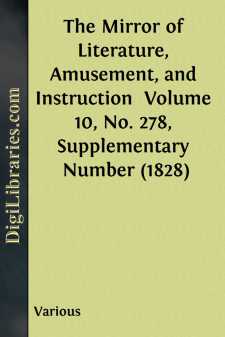Categories
- Antiques & Collectibles 13
- Architecture 36
- Art 48
- Bibles 22
- Biography & Autobiography 813
- Body, Mind & Spirit 142
- Business & Economics 28
- Children's Books 15
- Children's Fiction 12
- Computers 4
- Cooking 94
- Crafts & Hobbies 4
- Drama 346
- Education 46
- Family & Relationships 57
- Fiction 11828
- Games 19
- Gardening 17
- Health & Fitness 34
- History 1377
- House & Home 1
- Humor 147
- Juvenile Fiction 1873
- Juvenile Nonfiction 202
- Language Arts & Disciplines 88
- Law 16
- Literary Collections 686
- Literary Criticism 179
- Mathematics 13
- Medical 41
- Music 40
- Nature 179
- Non-Classifiable 1768
- Performing Arts 7
- Periodicals 1453
- Philosophy 64
- Photography 2
- Poetry 896
- Political Science 203
- Psychology 42
- Reference 154
- Religion 513
- Science 126
- Self-Help 84
- Social Science 81
- Sports & Recreation 34
- Study Aids 3
- Technology & Engineering 59
- Transportation 23
- Travel 463
- True Crime 29
The Mirror of Literature, Amusement, and Instruction Volume 10, No. 278, Supplementary Number (1828)
by: Various
Categories:
Description:
Excerpt
THE NEW PALACE IN ST. JAMES'S PARK.
Palaces are at all times objects of national interest, or rather they are national concerns. They belong to the attributes of royalty, and in some instances have been erected by a grateful people to celebrate the virtues of patriot princes. We therefore make no apology to our readers for occupying so large a portion of the present Supplementary Number with the representations and details of the New Palace, (the exterior of which is just now completed,) and of the consequent improvements in the adjoining Parks; since we are persuaded that the patriotic feelings of our subscribers will hail them as subjects of paramount importance. The great Lord Bacon, who treated these matters with the gravity of a philosopher, in his "Essays," gives a "brief model of a princely palace;" and in our times Napoleon is known to have expended many thousands in restoring the gilding of the palace at Versailles—although the extravagance of its founders paved the way for the events in which he distinguished himself.
In architectural improvement, London has made greater advances since the late peace, than in the entire century which preceded that auspicious event. Being unquestionably the richest, the largest, and most populous city of Europe, the seat of a wealthier court, and a more opulent body of nobility and gentry than any other metropolis, it seems only a reasonable expectation that it should likewise excel all others in the number and magnificence of its public edifices and private dwellings. Such, however, is not the case; for, till within the last few years, that most splendid and impressive of all the arts, architecture, has been almost wholly neglected.
The architectural superiority of London, such as it is, consists in the number, size, and neatness of its principal streets and squares. Petersburgh, Berlin, Naples, Turin, Geneva, Antwerp, Edinburgh, and other places, have perhaps finer streets than any in London, but in respect to their number there is no comparison. In churches, London will probably be admitted, after Rome, to take the first rank among the cities of Europe; but in palaces, London is confessedly excelled by almost every other capital in Europe, both in public and private edifices of this description; of the former, Whitehall, Carlton-house, (now almost demolished,) and the Mansion-house, comprise the whole list of buildings any way entitled to the appellation of palaces—and even their title has often been thought disputable.
To rescue our national character from this opprobrium, or ill-timed compliment to royalty, the remodelling of Buckingham-house, or rather the erection of the New Palace in St. James's Park, was decided on; and how far this design has been accomplished in the palace, we leave it to the taste of our readers to determine. Various piecemeal, not to say absurd, descriptions have, during the progress of the work, appeared in the London and provincial papers, many of them originating in party feeling; but the structure has now so far advanced to completion as to enable every spectator to estimate its merits and demerits; and we are sorry to add, that much of the censure bestowed on the palace during its progress (though with bad motives) now proves essentially correct....












